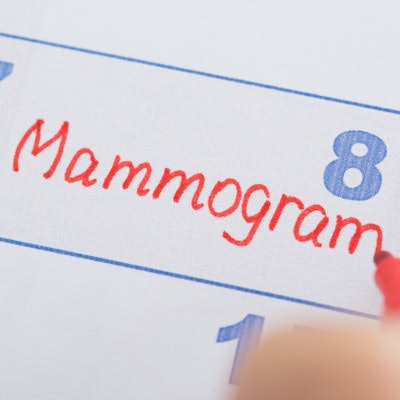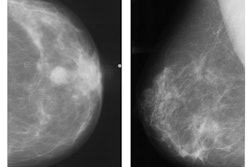
Opt-out, population-based strategies do not significantly increase screening mammography uptake, according to research published September 11 in JAMA Internal Medicine.
A team led by Leah Marcotte, MD, from the University of Washington in Seattle found in a study of Veterans Affairs (VA) populations that an opt-out approach led to significantly more canceled mammography referrals than opt-in approaches.
"While our results did not indicate greater effectiveness of an opt-out strategy for [screening] compared with an opt-in strategy, the comparable results for a less burdensome outreach approach may be valuable to VA operational leaders interested in population-based breast cancer screening outreach," Marcotte and colleagues wrote.
Breast cancer screening rates have been lower within the Veterans Health Administration (VHA) since the COVID-19 pandemic. Some barriers to screening include scheduling, long wait times, and lack of onsite mammography at VA centers.
Previous research suggests that opt-out programs, which deliver services to all eligible participants and with the option to decline, are effective in increasing influenza vaccination and colon and cervical cancer screening rates. These studies compared this approach with opt-in strategies, which offer services to all eligible participants but deliver them only to those who actively accept.
Marcotte and colleagues sought to assess the impact of an opt-out automatic mammography referral strategy on breast cancer screening. It compared this approach with an opt-in automated telephone message strategy. The researchers conducted the trial between 2022 and 2023 at a single VA medical center. The primary outcome was a completed mammography exam 100 days after outreach, with secondary outcomes being completed mammography by 100 days after outreach and referrals canceled if mammography was not scheduled within 90 days.
The researchers included data from 883 veterans with an average age of 59.1 years. Of these, 442 were randomized to the opt-in group and 441 to the opt-out group.
The team found no significant difference in either primary or secondary outcomes within either group. However, they also found a significantly higher number of canceled referrals in the opt-out group compared with the opt-in group.
| Comparison between opt-out, opt-in groups for mammography completion | |||
| Outcome | Opt-in | Opt-out | p-value |
| Completed mammography exams at 100 days | 14.9% | 15.2% | 0.9 |
| Percentage of completed or scheduled mammography exams | 24% | 19% | 0.07 |
| Canceled referrals | 5.4% | 23.6% | < 0.001 |
Using restricted analysis, which excluded veterans who were unable to be reached by telephone or who were found to be ineligible, the researchers also found that more veterans in the opt-out group completed or scheduled mammography within 100 days. This included 102 of 388 veterans (26.3%) in the opt-out group compared to 80 of 415 (19.3%) in the opt-in group (p = 0.02).
The study authors suggested that based on their results, health systems should consider both potential effects and excess administrative burden when choosing between opt-out and opt-in outreach approaches.
"The administrative burden of the opt-out approach, including medical record review of all veterans prior to outreach to confirm [screening] eligibility, at least one telephone call to eligible veterans, and an increased number of canceled referrals following outreach, likely outweighs any potential added benefit," they wrote.
In an accompanying editorial, Kimberly Waddell, PhD, and Shivan Mehta, MD, from the University of Pennsylvania in Philadelphia wrote that despite evidence suggesting the potential for opt-out strategies, there is heterogeneity of effect. They added that careful planning is needed for such interventions to fit into healthcare delivery workflows and add to other routine clinical and educational efforts.
"Making it easier for patients to complete the required steps of preventive cancer screenings deserves as much attention as simply shifting the default option," the two wrote.
The full study can be found here.




















